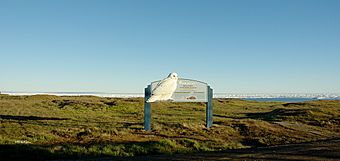Birnirk site facts for kids
|
Birnirk site
|
|

Mounds at the site
|
|
| Location | Address restricted |
|---|---|
| Nearest city | Utqiagvik, Alaska |
| NRHP reference No. | 66000953 |
Quick facts for kids Significant dates |
|
| Added to NRHP | October 15, 1966 |
| Designated NHL | December 29, 1962 |
The Birnirk site (which is Piġniq in the Iñupiaq language) is an important archaeological site located near Utqiagvik, Alaska. It has sixteen old mounds that show signs of early Birnirk culture and Thule people living there. This site is so important that it's known as the "type site" for the Birnirk culture. This means it's the main place where scientists first learned about this ancient group of people. In 1962, it was named a National Historic Landmark because it helps us understand ancient Arctic cultures.
Contents
What is the Birnirk Site?
The Birnirk site is found on the Alaska North Slope, close to the town of Utqiagvik. Since 1988, the land has been owned by the Ukpeaġvik Iñupiat Corporation. The site has sixteen mounds, which are actually old dwelling places. These mounds show that people lived here over a long time.
Discoveries at Birnirk
Scientists did big digs at the site in 1936, and again from 1951 to 1953. During these digs, they explored three of the mounds. In 1959, they dug into parts of seven more mounds. Most people lived at this site during the Birnirk culture period, which was between the years 500 and 900 CE.
Evidence was also found in one mound that people from the later Thule culture lived there. The Thule culture was generally active between 1100 and 1400 CE.
What Did They Find?
Many interesting things were found at the Birnirk site. These include harpoon heads made from antler and stone. One harpoon head even came from an older culture called the Punuk culture. Scientists also found pieces of wood that were part of traditional umiaks. Umiaks are special boats used for hunting seals.
Why is Birnirk Important?
The Birnirk site was named a National Historic Landmark in 1962. It was also added to the National Register of Historic Places in 1966. For many years, the main collections of items found at the site were kept at Harvard University's Peabody Museum of Archaeology and Ethnology. But in 2011, these important items were moved to the University of Alaska Museum of the North in Fairbanks.
 | Precious Adams |
 | Lauren Anderson |
 | Janet Collins |

